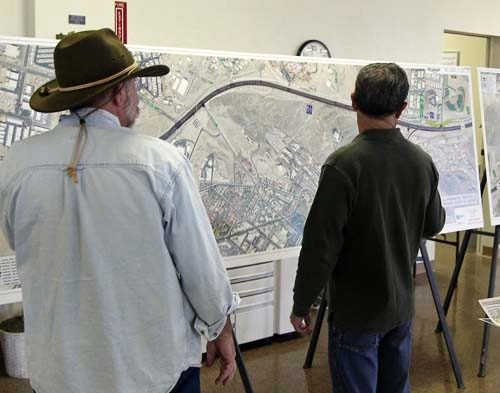Plan to relieve Boulder City traffic unveiled
Representatives with the Nevada Department of Transportation attempted to appease Boulder City residents Thursday by explaining that they are pushing through a project in three months that should take a year.
Their update on the widening of U.S. Highway 93 leading to the Hoover Dam bypass bridge did little to calm folks frustrated by the bumper-to-bumper traffic that has clogged the roadway since the new span opened in October.
Severe bottlenecks occur on two miles of the northbound highway and five miles of the southbound because those stretches are only one lane in each direction. The remainder of the highway, including the bridge, are two lanes in each direction.
Tony Lorenzi, a traffic engineer with the Nevada Transportation Department, said the $15 million widening project should begin in the summer and be finished by late fall.
"NDOT wants to see this go forward as much as anybody," he said.
Residents who live on the south side of the highway said making a left turn to head into town can be virtually impossible unless a motorist is kind enough to let them in. Otherwise, they are stuck.
Widening the highway to two lanes might alleviate the backup, but drivers also might be inclined to speed, making left turns even more dangerous.
"We don't know what it (the speed limit) is going to be," the traffic engineer, Kent Sears, said. "It is likely to be higher (than the existing 45 mph speed limit), but we will do an analysis when the lanes are done."
The state transportation department did not foresee the traffic jams when it failed to make improvements to the highway prior to the opening of the $240 million O'Callaghan-Tillman Memorial Bridge.
Transportation officials in Arizona widened the freeway on their side of the bridge, leaving Nevada to blame for the back-ups that some fear will discourage Arizona tourists from visiting Las Vegas.
The state opted to fund the widening itself rather than using federal money, eliminating more detailed -- and time consuming -- environmental impact studies required by the federal government.
Four months ago, Jacob Snow, general manager of the Regional Transportation Commission, announced plans to file a state of emergency with the Federal Highway Administration to persuade the agency to ban tractor-trailers from the bridge until traffic problems are resolved.
Despite Snow's declaration that the traffic woes have created an emergency, an application has yet to be filed.
State and local transportation officials are pushing for a bypass to dip below Boulder City, but the approximately $300 million needed is not available.
"Why isn't this money being put toward the bypass? That's what we need," Boulder City resident Terry Jensen said.
Lorenzi said the $15 million being invested in the short-term solution wouldn't put a dent in the amount needed to complete the bypass.
Contact reporter Adrienne Packer at apacker@review journal.com or 702-387-2904.






















